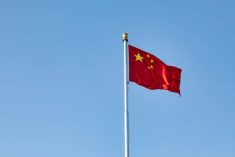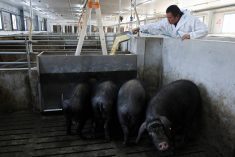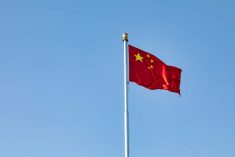Beijing | Reuters — Zhengzhou rapeseed (canola) meal and oil contracts jumped on Monday, the first day of trade since China decided to impose 100 per cent tariffs on imports of those products from Canada.
The most-active rapeseed meal futures on the Zhengzhou exchange climbed six per cent to close at 2,611 yuan (C$518) per metric ton – the biggest daily rise since September 2022.
Why it matters: China represents a massive market for Canadian agricultural products
Canada’s exports of rapeseed oil, oil cakes and peas were worth roughly $1 billion (C$1.44 billion) last year. The tariffs, effective March 20, come in tandem with a 25 per cent duty on Canadian aquatic products and pork, worth $1.6 billion (C$2.3 billion) in 2024.
Read Also

U.S. grains: Chicago corn, soy prices recover on updated biofuel guidance
Chicago | Reuters – Chicago grain and soybean futures regained ground on Tuesday as a selloff in commodity markets subsided…
The levies follow 100 per cent and 25 per cent tariffs Canada imposed on Chinese-made electric vehicles and steel last year.
The new tariffs are expected to raise the cost of Canadian canola oil, easing domestic oversupply pressure and helping to stabilize rapeseed oil prices, said China Grain Net, an information provider affiliated with state stockpiler Sinograin.
However, analysts say the price spike may not last long.
“China has alternative origins for rapeseed oil such as Russia and the EU and also the Chinese import duty hike could pressure Canadian canola prices, resulting in a sharp decline in product prices,” said Anilkumar Bagani, research head of Mumbai-based vegetable oil broker Sunvin Group.
“It also needs to be noted that China has huge rapeseed oil stocks at the moment and the crush capacity utilization is also considerably high,” Bagani said.
Additionally, China’s Zhengzhou Commodity Exchange said it will raise the minimum order size per trade for some rapeseed meal futures contracts to 10 lots from one lot previously, starting from the night trading session on Monday.
The exchange increased the minimum order size to reduce retail investor participation and avoid price fluctuations caused by a large number of small orders, said Xuan Dongshuang, an analyst at research firm Sublime China Information.
China last year began an anti-dumping investigation into Canadian canola, but canola was not included among the tariffs announced on Saturday, just rapeseed meal and oil.
This likely leaves room for negotiation during trade talks, traders and analysts said.
The anti-dumping investigation on canola has reduced direct imports in the first quarter this year, with imported canola meal expected to make up over 50 per cent of total supply, China Grain Net said.
“However, once the investigation concludes, imports of Canadian rapeseed meal are likely to drop, leading to tighter supply,” it added.
— Reporting by Ella Cao, Lewis Jackson and Mei Mei Chu in Beijing















